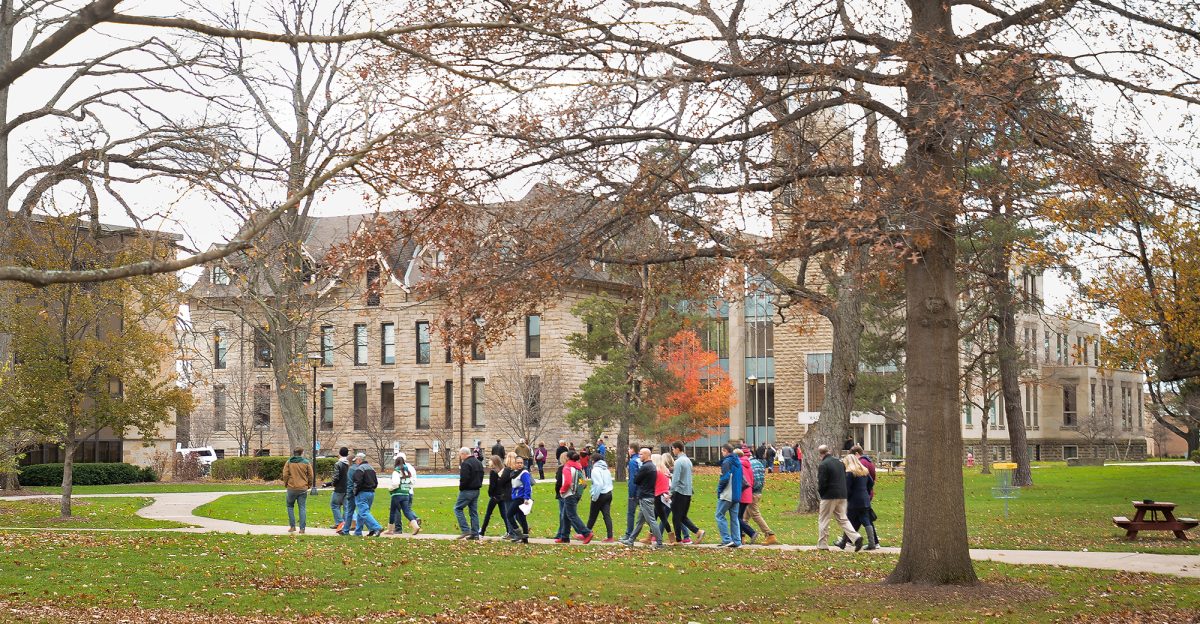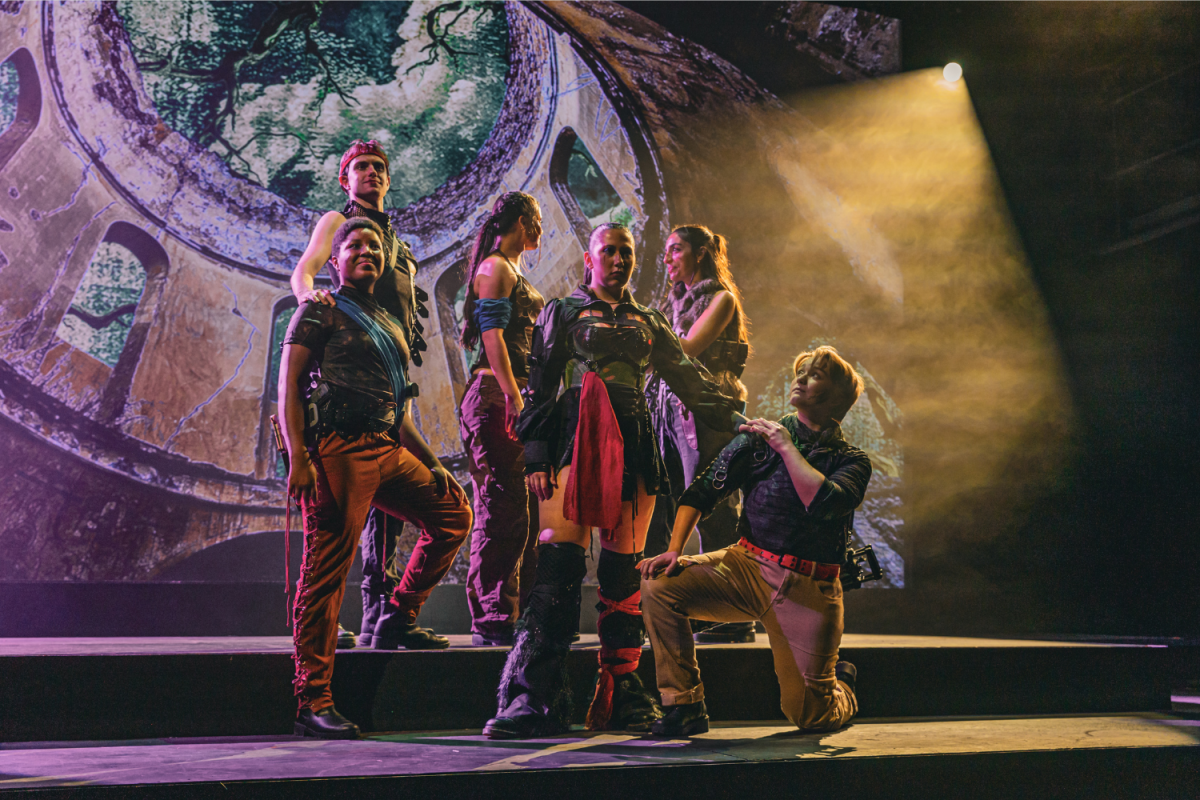Baldwin Wallace University voice performance students bring post-apocalyptic empires to Playhouse Square’s Helen Theatre with their production of “Radamisto,” premiering on Oct. 11.
“Radamisto” is an 18th century opera written by George Frideric Handel as a part of the opera seria genre, which was highly dramatic and involved themes of betrayal, romance, and mistaken identity.
This opera centers on the political and personal conflicts between Radamisto, the prince of Thrace, and King Tiridate of Armenia. In this iteration of “Radamisto”, the characters are descendants of two ancient empires, and the conflicts occur in post-apocalyptic Manhattan Island.
“Radamisto” is directed by Director of Opera Studies Scott Skiba, who chose to recontextualize the opera in a setting where there was little sense of government and law. Additionally, Handel’s opera mentions architecture similar to those found in New York City, so Skiba chose Manhattan to avoid developing elaborate explanations for the new geographical setting.
“I always like to find ways to present operas in a way that is authentic to the story, and in a way that is authentic to the text [and] makes it understandable to current audiences,” Skiba said. “One way to do that is to … look at another period of which it can be set.”
Junior voice performance student Beth Satariano, who plays Radamisto in the Midtown Cast, said that this opera is not as popular as the department’s previous productions, but it has been exciting to find ways to make the production feel more modern and “immediate” for audiences.
“Opera can sometimes feel very inaccessible,” Satariano said. “Being able to take something that’s from the 1700s … and making that accessible and bringing in a new layer of storytelling by changing the setting … I think it’s really cool.”
Satariano described Radamisto as a very moral character who has a strong sense of duty, which was interesting to put in this post-apocalyptic context. Additionally, she said that playing a male character adds an “extra level” of movement and facial acting that she was excited to explore.
“There is a very long running tradition of women with slightly lower voices playing male parts, so that’s an area that I usually fit into,” Satariano said. “I do have some practice with that, but it’s always really fun to get to take up space as a different person and try to present a different way.”
“Radamisto” is sung entirely in Italian, so the cast spent considerable time learning the music and proper pronunciation. Satariano said that with the fall opera, the students receive their roles and music in the summer, so they had time to look over the material prior to the start of the semester. After arriving on campus, the cast worked one-on-one with music director Jason Aquilla, who is very knowledgeable about the language and diction.
“There’s multiple extra steps that don’t exist when you’re singing in your native language,” Satariano said. “There’s a lot of time spent on your own just figuring out the pronunciation, exactly what each word you’re saying means, and then taking it to the level with now, we’re singing the notes.”
While Satariano is playing a large role, students like sophomore voice performance major Austin Prince have much smaller roles in the opera. Prince, who plays Radamisto’s father King Farasmane in the Battery Park Cast, said that while he only sings one song, he has learned a lot from the experience of learning how to sing in Italian. This is his second opera at BW and first opera in a foreign language.
“I actually think that this role was a very good role to have for my first time around because it’s not a ton of content. So, it’s a very good challenge, but it’s also a good [experience] easing me into it,” Prince said. “But it’s really fun work, and it’s a really fun piece, so it’s definitely worth all the extra work.”
Prince said that working with a double-cast show has been very helpful because he and his Midtown Cast double, junior voice performance student Noah Sych, were together during most rehearsals, and they learned from each other’s takes on the character.
“We have mentors in our program, and [Sych] was my mentor last year, and so I’ve always looked up to him and his performances,” Prince said. “So, it’s been kind of crazy being double cast with him, but it’s been really nice.”
“Radamisto” will be performed in Playhouse Square, which provides students with the experience of performing in a professional theater setting. While Satariano has performed BW operas in this setting before, this is Prince’s first experience acting in this space.
“I grew up in the Akron area, and so Playhouse Square has always been a very respected performance space,” Prince said. “I feel very honored and very excited to perform there, but there’s also definitely a large pressure that comes with that.”
The Helen black box theatre allows production teams to totally design the staging and customize the seating arrangements for their productions. While Skiba has opted for alley staging in the past, this opera will be arranged like a proscenium with much of the action happening on an elevated platform with seating in front of the action.
With the Helen’s intimate setting, Skiba said the actors will act “moment-to-moment” and be very engaged with the audience. And, with the nearest seat being four feet away from the actors, the students will not be able to hide anything from the crowd.
“I love opera when you can get the audience this close because it’s a very visceral art form. It’s the human body doing the most it can do without being amplified,” Skiba said. “There’s just something about that intensity of sound and pinging in your ears.”
Skiba said the production’s design was heavily inspired by graphic novels, and they are making heavy use of choreographed lighting and projections to portray the opera’s post-apocalyptic setting. Additionally, all supertitle translations will be projected above the stage and styled like text bubbles.
Prince said he hopes audiences will come to see “Radamisto” with an open mind, especially if they have not experienced an opera in a foreign language, because “opera is very alive, and it is very active in today’s world.”
By recontextualizing the opera with a modern audience in mind, Satariano said she hopes audiences will see that they are “still telling human beings’ stories,” they are just highly dramatized for entertainment-value.
“I hope that audiences see this and know and maybe have a new understanding that opera can be far removed and has very deep roots and historical ties that we can’t ignore,” Satariano said, “but that doesn’t mean it has to be so far removed from nowadays.”
“Radamisto” runs Oct. 11-13 in Playhouse Square’s Helen Theatre. There is a limited number of tickets available.































